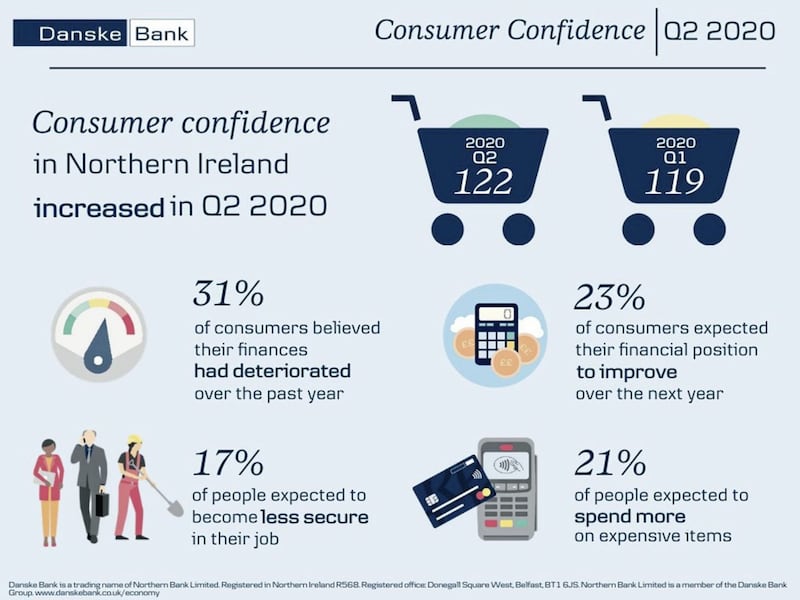WITH lockdown easing, consumer appetite for spending is gradually returning in Northern Ireland, according to fresh analysis from Danske Bank.
One in five (21 per cent) of respondents to its latest Consumer Confidence Index say they plan to spend more on big ticket items like cars or home improvements (44 per cent plan to spend less).
Even more (23 per cent) indicated that they expect their financial position to improve over the next year, though given the obvious worries about a rise in unemployment and falling house prices caused by the coronavirus crisis, 33 per cent fear it will deteriorate.
Some 17 per cent expect to become less secure in their jobs, according to the index, which revealed that consumer confidence levels in Northern Ireland increased slightly in the second quarter but stay well below where they were this time last year.
The index increased to 122 in Q2, up from 119 in the first quarter of 2020 but still significantly below the reading of 136 posted in the second quarter of 2019.
Field work was carried out during June just as the lockdown restrictions had started to be gradually eased, and there appeared to be a modicum of a feel-better factor.
Danske Bank chief economist Conor Lambe said: “As the economy started to reopen, confidence levels increased slightly. But while welcome, sentiment is lower than in the second quarter of last year, so we must hope for further increases going forward to provide some momentum to what is likely to be a very gradual economic recovery.”

When asked what had the largest positive impact on their confidence levels, 30 per cent of respondents pointed to the gradual easing of lockdown. A further 16 per cent of people said that government measures aimed at protecting jobs and incomes, such as the furlough scheme, had a positive impact on sentiment. Ten per cent of consumers also cited low interest rates as a positive.
But the coronavirus pandemic clearly continues to weigh heavily on confidence levels.
Mr Lambe added: “These findings suggest the unprecedented step of having to shut down large parts of the economy due to the pandemic is likely to influence consumer behaviour and willingness to spend for some time to come.”
Brexit continues to be an area of concern for consumers, with 15 per cent saying the government’s longer-term objectives had adversely impacted them and a further 9 per cent of people saying the status of the negotiations was the factor that had the largest negative impact on how they were feeling.
Mr Lambe said: “Given the considerable uncertainty around what will happen when the transition period ends, many consumers continued to regard Brexit as having a negative impact on their confidence levels.
“For Northern Ireland businesses, it's important they recognise that Brexit remains a live issue and take what steps they can now to be as prepared as possible for the changes taking effect from the beginning of next year.”





